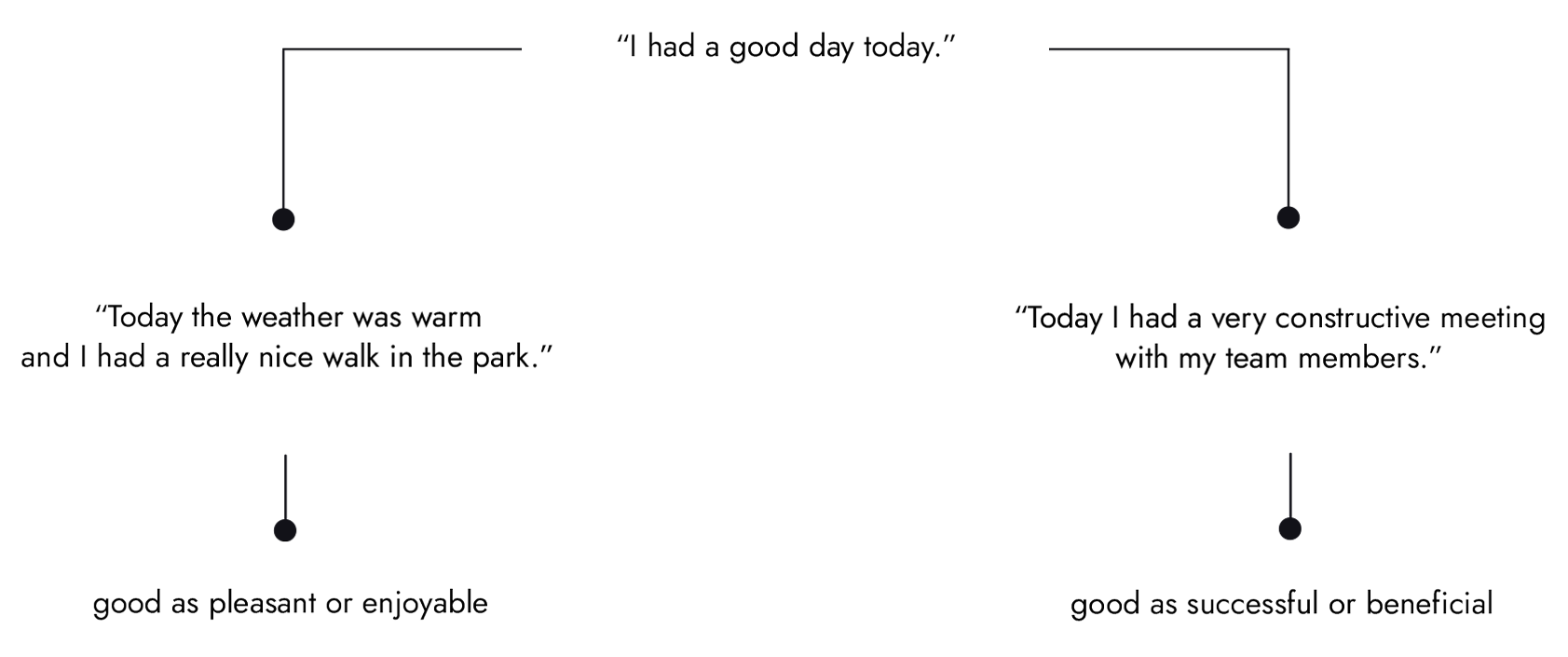
The Significance of Content
Content Is the Energy of Your Business
There’s a common misconception about what constitutes content in a business environment. Many believe it refers to company communication, particularly texts and images. However, all business activities, irrespective of their form, are business content representative of ideas, messages, and meanings that a business utilises to position itself in the market. Furthermore, most companies rarely realise that all activities are symbolic and thus constantly produce meanings. These activities can take many forms, from text and numbers to visuals and behaviours, all working together to create a compelling proposition and product, service or brand story that highlights the value of your business.
A. What is Content
In the appropriate sense of the word, content is the meaning of symbols. It is essential to realise that everything acts as a symbol with meaning: words, numbers, images, objects, textures, shapes, smells, sounds, behaviours and anything else constituting our experienced reality. Ultimately, our perceptions involve interpreting the meaning of symbols.
The complexity of meaning lies in its non-tangible nature; we understand it only through the symbols that represent it. This is the origin of all problems related to the analysis of content, especially the meaning of language, the essential component of thinking. Since our thoughts and ideas are conceptualised in their symbolic form, it becomes challenging to untangle the idea from the symbols (words or other signs) used in expressing it. This is especially important in business, where ideas are processed by different people from different fields inside and outside the company environment. Ensuring that ideas retain their meaning across different representations and people is the task of content processing and TWS Business Logic.
B. The Characteristics of Content
Content is essential in providing a unique and sustainable value for your business. The content you produce is individual to your business, products or services, brands, and people. It defines your efforts, perception of the market, and thinking in solving problems and generating ideas. The possibilities for how you define your business purpose and deliver your customer experiences are endless because content can be easily developed, expanded and generated anew. Content provides an open and dynamic system of value generation. To unlock the potential it provides, it is crucial to have a comprehensive understanding and implementation of the logic underpinning the creation of clear and significant meanings that propel growth. There are four essential characteristics of content that you need to consider:
1. Meaning is subject to interpretation. The relationship between symbol and meaning is not fixed; thus, meaning is always open to interpretation. To ensure messages are correctly interpreted, one must clearly define their intended meaning, utilising the correct symbols since symbols are the carriers of meaning.
For example, suppose you are in the food business, and your proposition focuses on naturalness. How you define and represent naturalness will play a determining role in the value you create. Naturalness is a broad concept encompassing a wide range of qualities, including natural production methods, freshness, purity, simplicity in form, richness in taste and texture, and many more. However, these qualities are further defined by other qualities and symbolic representations. Therefore, the value of your product and brand will depend on how you define naturalness and how you synthesise the qualities that constitute its meaning in developing a significant proposition for both the customer and your business.
2. The same symbol has multiple meanings. Since the relationship between symbol and meaning is non-fixed and thus variable, the same symbol can construct different meanings across different syntheses. For example, one may define the quality of “a good day” in different ways, two of which may be the following:

3. Defining meaning is the result of a synthesis. Since meaning is represented through various symbols, specifying meaning depends on the set of symbols that come together to form a composition. For example, how you construct the idea of “trust” for your brand differs if you are in the banking, pharmaceutical or construction business.
This synthesis is not arbitrary, as the outcome would be meaningless. Instead, the construction of meaning is an open system of interrelated elements that produce specific results within a specific organisational framework. How variable symbols and meanings are organised into clear, wholistic propositions is the work of logic.
TWS Business Logic provides the pathway to the desired outcome by pointing out the types of relationships that direct meaning by illustrating how they must be organised to synthesise the definition of a particular propositional concept. The rules underlying the logical organisation of symbols in producing meaningful propositions allow the development, expansion and evolution of concepts.
Meaning is best understood and communicated through clear definitions, as they limit the scope of interpretations and secure clarity. However, the precise definition of a single quality is a wholistic composition of other qualities with their subsequent definitions.
4. Understanding meaning is a qualitative evaluation process. Meaning represents qualities that describe things, experiences, situations and more. It is, therefore, non-tangible and qualitative in nature. Understanding meaning involves evaluating the symbols that synthesise concepts and ideas. For example, your product pricing may be perceived as expensive, affordable, reasonable, value for money, or cheap. Each of these evaluations represents a meaning that is constructed on the basis of your market, business, and customer-based content. In addition, perceptions of your pricing are influenced by the meanings underlying your proposition, packaging, branding, and every other activity you undertake to promote your product.
Unfortunately, many businesses are keener on adopting “big words” and catchy tag lines in formulating propositions than defining a conceptual domain that will fuel all business activities with meaningful content that will resonate with their customers. Conceptual domains are broad ideas that can generate a plethora of propositions and fuel business growth. For example, the quality of “naturalness” is quite broad in meanings, but “goodness,” of which “naturalness” is a constituent part, is even more expansive, providing a much richer framework for the generation of propositional ideas.
To truly create, sustain, and increase value, it’s crucial to have a deep understanding of the system of meanings that underpins how you interpret, synthesise, and create content. This system represents the foundation of the logic you use to develop value.



